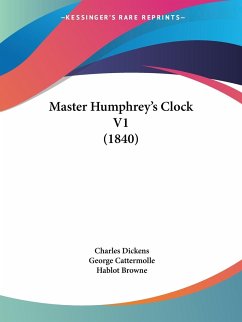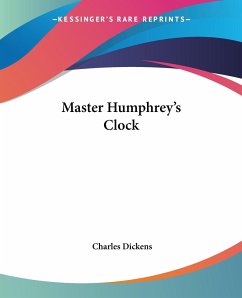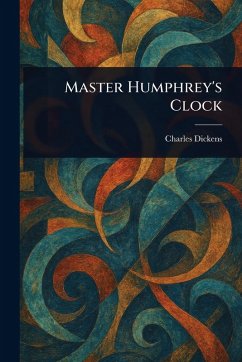
Master Humphrey's Clock V1 (1840)

PAYBACK Punkte
14 °P sammeln!
Master Humphrey's Clock is a novel written by Charles Dickens in 1840. The novel is divided into three parts, with the first part being the most famous. The novel is set in London and follows the life of Master Humphrey, an old man who runs a clock shop. Master Humphrey is a kind and generous man who enjoys the company of his friends, who often gather in his shop to tell stories.The first part of the novel is a collection of short stories, which are told by Master Humphrey and his friends. These stories are set in different parts of London and feature a variety of characters, including thieves...
Master Humphrey's Clock is a novel written by Charles Dickens in 1840. The novel is divided into three parts, with the first part being the most famous. The novel is set in London and follows the life of Master Humphrey, an old man who runs a clock shop. Master Humphrey is a kind and generous man who enjoys the company of his friends, who often gather in his shop to tell stories.The first part of the novel is a collection of short stories, which are told by Master Humphrey and his friends. These stories are set in different parts of London and feature a variety of characters, including thieves, prostitutes, and wealthy businessmen. The stories are often humorous and satirical, but they also deal with serious issues such as poverty, crime, and social injustice.The second part of the novel follows the life of a young girl named Little Nell, who is the granddaughter of Master Humphrey's friend, the landlord of a London inn. Little Nell is a kind and innocent girl who is forced to leave her home and travel across England with her grandfather in search of a better life. Along the way, they encounter a variety of characters, including a group of traveling actors, a schoolmaster, and a wealthy landowner.The third part of the novel returns to the format of the first part, with Master Humphrey and his friends telling more stories. However, the tone of these stories is darker and more serious than in the first part, and they deal with themes such as death, madness, and the supernatural.Overall, Master Humphrey's Clock is a rich and complex novel that explores the many facets of life in 19th century London. It is a powerful commentary on the social and economic conditions of the time, and it remains a classic of English literature to this day.This scarce antiquarian book is a facsimile reprint of the old original and may contain some imperfections such as library marks and notations. Because we believe this work is culturally important, we have made it available as part of our commitment for protecting, preserving, and promoting the world's literature in affordable, high quality, modern editions, that are true to their original work.













